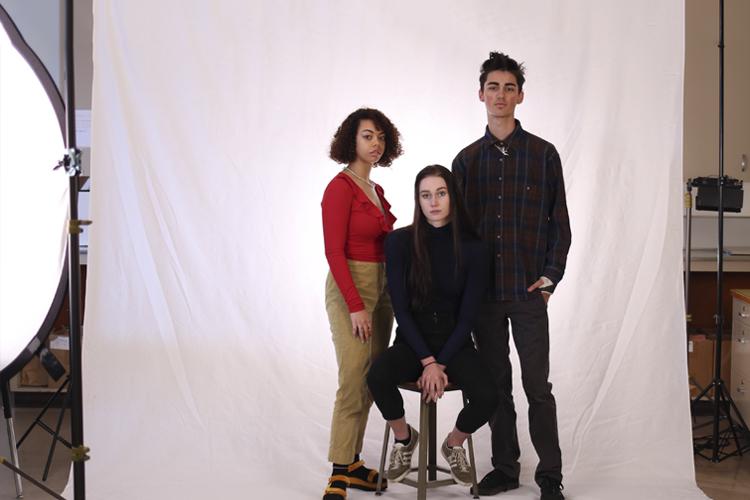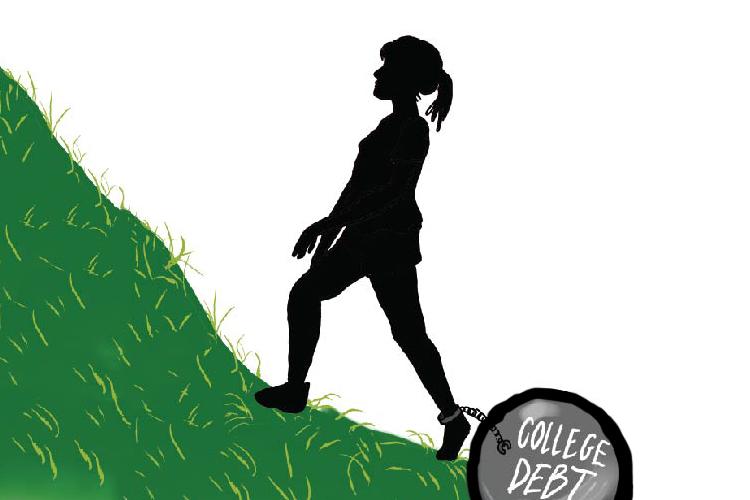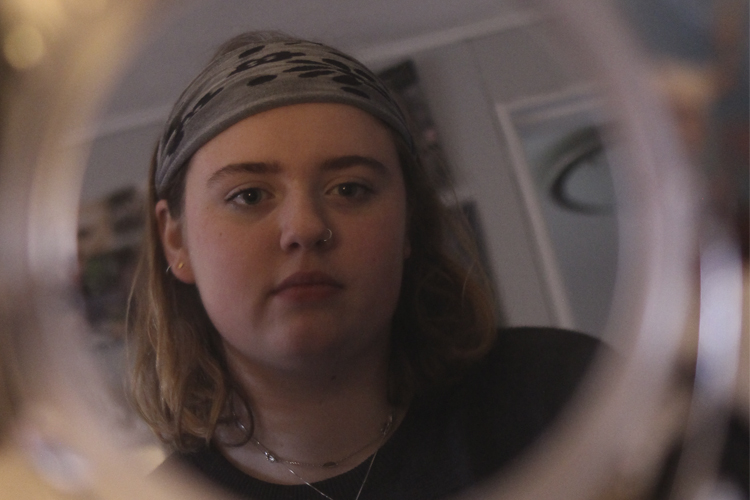
In October 2017, a list warning models about dangerous photographers was released within the Portland metro area. This list, which included the names of 60 photographers with backgrounds involving sexual harassment, circulated on Instagram among models and non-models alike. Subsequently, the list brought attention to additional problems in the modeling industry which often go overlooked.
Piper Kittersong – a 16-year-old student in the Portland Public Schools district and model signed to Sports and Lifestyle Unlimited Agency – says that the reason issues of racism and sexism are pushed under the rug is because the modeling industry cultivates an environment that silences the voices of models. “I think it’s, like, the rep that you get, because if you do what you’re told and get the job done, you’ll get more bookings, but if you actually speak your mind and tell them how you want it to go, they’ll think you’re controlling their creative process,” says Kittersong. “No one would book you anymore, which is why people don’t (speak out).”
To better understand these unspoken problems, Grant Magazine talked to a few Grant students involved in the industry. Learn about their encounters with racism, sexism, body-image struggles and hyper-masculinity while working as models.
. . .

Ryland Vinar
Junior
As a model, have you noticed any problems within the modeling industry?
You need to look a certain way, you need to act a certain way. You can’t eat too much, you can’t cut your hair this way, and that’s part of the contract. They restrict you from permanent style choices, like bleaching hair and things like asking you about what you’re eating. But, yeah, it’s hard to have that pushed on you.
How do you think being a male model differs from being a female model?
It’s a lot of hyper masculinity. They ask me not to smile in my shoots sometimes. I have to stand up really tall and puff my chest out. It’s just super hyper masculine and, being gay, I’m not super used to that. But yeah, it’s like a lot of shirtless posing. I don’t think we have it as hard as female models do, especially with body standards.
How does that hypermasculinity make you feel?
Boys egging each other on can really be a dangerous thing, and I think that that can easily … go from hyper masculinity into sexism, or hyper masculinity into homophobia, or into racism. It’s scary for me to see young men just like trying so hard to be so tough, and trying so hard to be so without emotion that I’m afraid that they’ll actually believe that they do not feel emotion, and that it’s okay. These guys are trying to make up for the fact that they’re modeling, because modeling isn’t a very masculine thing in societal standards, so they try so hard to prove how masculine they are, so they kind of overcompensate.
You talked about your experiences with self-confidence. Could you elaborate on that?
When I was first being scouted, I didn’t work out at all. After my first shoot … it was me and two other guys, and they … had more chiseled features, they looked older and they were more filled out, and I’m kind of naturally more skinny, and so I was immediately very quiet, and I didn’t want to talk to anyone. I was scared just because I felt, “Why am I here? I’m not even on par with these guys.” After that I started working out almost daily … I would kind of do it secretly in my room and not tell (my family) how much I was working out, but they noticed I wouldn’t eat at dinner. That’s when they started getting worried. The minute when they noticed the first signs of me possibly harming myself, they shut it down fast. They kind of had to slap me awake, and that kind of resonated with me … that’s when I started to turn (my habits) around.
I want to say that I know I made it sound like an awful business, but it is fun and there are good parts and you actually do bond a lot with the other guys. They’re not all bad, and a lot of them pretty much know the struggle of self-confidence. I’ve noticed that a lot with female models, (they are) always trying to hype each other up. I don’t see that as much in male industry, but there are good parts to it.

Sydney Rawls
Sophomore
How did you get into modeling?
Around Halloween time this year, my agency now — which is Reaction modeling agency — (Instagram direct-messaged) me. So I met with the head of that, Jeff Shanes, like a week later, and then I signed with him.
What has your experience been like as a model?
(In) modeling, there’s like no people of color. The other day, our agency did a shoot with about five of the models that work for my agency, and I was the only one who stood out, ‘cause I was the only one who was, one: a person of color, and two: the only one who was short and wasn’t 100 pounds … and just looking at them, I just found myself comparing myself. Even in the shoot, everyone was wearing sports bras and leggings except for me. I had a shirt on ‘cause I’m not the skinniest out of all of them, so I had to cover up more than the rest.
And even at certain agencies, I feel like they’ll token people of color, like, ‘Look who we signed, we actually signed a model of color.’ I really think that they just use it to make themselves look better as a company, not necessarily because they want to use people of color … I’m still like not on our website much, and I’m still not presented on the main Instagram. It’s just little things because you’re using me for my looks, but you’re also using me because it makes you look better that you’re using a person of color.
Has that made you view yourself any differently?
Yeah, especially going into other shoots where there’s people who are way taller and skinnier than me. I don’t know, I feel like I used to be fine with the way I am, then I’ll go into a shoot and see all of these other models that are completely different than me, and I’ll be like, ‘Okay, I need to change a lot.’ (Makeup artists) will try to straighten my hair, try and do lighter makeup on me so I look lighter, and all of those things make me want to (change) things about myself. The way I’ve started to look at myself has been completely different than before I started modeling … because now I’ll look at my measurements and my height and my weight because I know that companies are looking at that.
You’re there to please (the company) and do whatever they want, not even really thinking about yourself or your self-worth; you basically just have to make their brand look good. Modeling has made me think about my eating habits and fitness and weight. Even if they don’t say it straight out to your face, they will not give you jobs if you’re overweight, like there’s certain jobs you can’t get if you don’t have abs. Before I didn’t really care about what I ate or anything, and now I find myself looking at calories and stuff. And for me, I don’t get a lot of jobs because I’m short. They judge me and my height. And also, companies send out your pictures and they send out your bra size, your waist, your hips, and they judge you on your measurements, not on face, really. So if your measurements aren’t up to their standards, then they’ll completely disregard you.
How has that affected you?
It just makes me think I need to change something. In the past, in my middle school life, I did have an eating disorder. I am really healthy now … but then I’ll look at other models, and I’ll look at people saying, ‘Oh, you should probably lose weight if you want to get this job,’ or, ‘You should probably work out more and eat better if you want to get these jobs.’ Like on the website, my measurements are one or two inches smaller than I actually am, and my height is taller than I actually am. I just want to try and help in any way I can to have there be a change for bigger models and people of color. I think I’ve had to compromise a lot of jobs because I’m not compromising my mental and physical health.
How does that make you feel?
It’s kind of like a big ‘f*** you’ to everyone because I shouldn’t change myself for (companies) to get money off of me. There’s a big gap in stuff we need to work on, and no one pays attention to the little things in the modeling industry.
Do you feel a sense of responsibility to change the industry?
I feel like that’s the main reason why I’ve kept modeling, because even though half the time I hate it and it makes me question myself and my self-worth, I do think that someone has to push boundaries, even if it’s little things. Maybe if it’s just me changing how one agency views height and weight and people of color, then hopefully that’s a start to change the modeling industry.

Mackenzie Lawrence
Junior
How did you get into modeling?
I was scouted freshman year. (Muse Management) just (direct-messaged) me on Instagram … I went in with my mom, and they like put me in this swimsuit and these heels, and I had to take these digitals. I just felt really gross about the whole situation.
Three-fourths of the way through sophomore year … I found (Reaction Model Management) and I contacted them. I didn’t even go in, we met for coffee with the owner and literally talked for three hours. I signed a week after that. They just felt more professional. Bottom line, they cared about my safety and my experience at jobs.
Before you got into modeling, were you judgemental of yourself?
Yeah for sure, definitely. It was just a different period of my life … I was so tall and lanky. I felt awkward, and now it’s like there’s a purpose for why I’m so tall and have really long legs. But you do have to think about the industry. People are gonna see this and they’re going to wish they had my body and you gotta carry that and be like, “What can I do to change this in the industry?”
Do you think that models can be objectified at shoots?
Luckily I’ve never experienced (objectification) … but I know I’m a very assertive person, and if I was feeling uncomfortable, I would definitely say something about it. One time I was at this shoot and (to) this girl in her twenties, the photographer was like, “Okay, so can you wear these pasties (nipple coverings) and nothing else?” and this girl was so uncomfortable. She came into the bathroom and I was like, “You should really say something if you’re not comfortable, I’ll go out there with you.” She ended up wearing a completely different thing.
What are some of the specific problems you see in the industry?
I think the biggest one right now is cultural appropriation. It’s kind of just a thing that people have become numb to, and it’s like the people who have been pushing back against cultural appropriation have almost been lost because it’s been such a constant thing. That’s really wrong that it’s like, “Oh, people are always talking about that, so just ignore it, it’s always going to be a problem.”
Who do you think needs to speak up within the industry?
I would say mainly designers because those are the people literally creating, drawing, every single day and making these things happen. And the art directors of shows. And especially the models who are like, really high up … Pretty much all the supermodels have partaken in some form of cultural appropriation. I think that’s why it’s so hard for them to genuinely understand that they need to … admit that (they) did something wrong, but it’s for a greater good.
You recently decided to take a break from modeling. What led you to make that decision?
I just thought I needed more time to define myself and … figure out who I was before I tried to express myself creatively. Also just spend more time with myself without pressure of feeling like I needed to be a certain person or look a certain way. I think it’s just a matter of being aware of your surroundings and helping other people. L.A. and New York and places like that I hear like awful stories of what happens backstage … it just makes me want to go into (the industry) more and be the change.



































